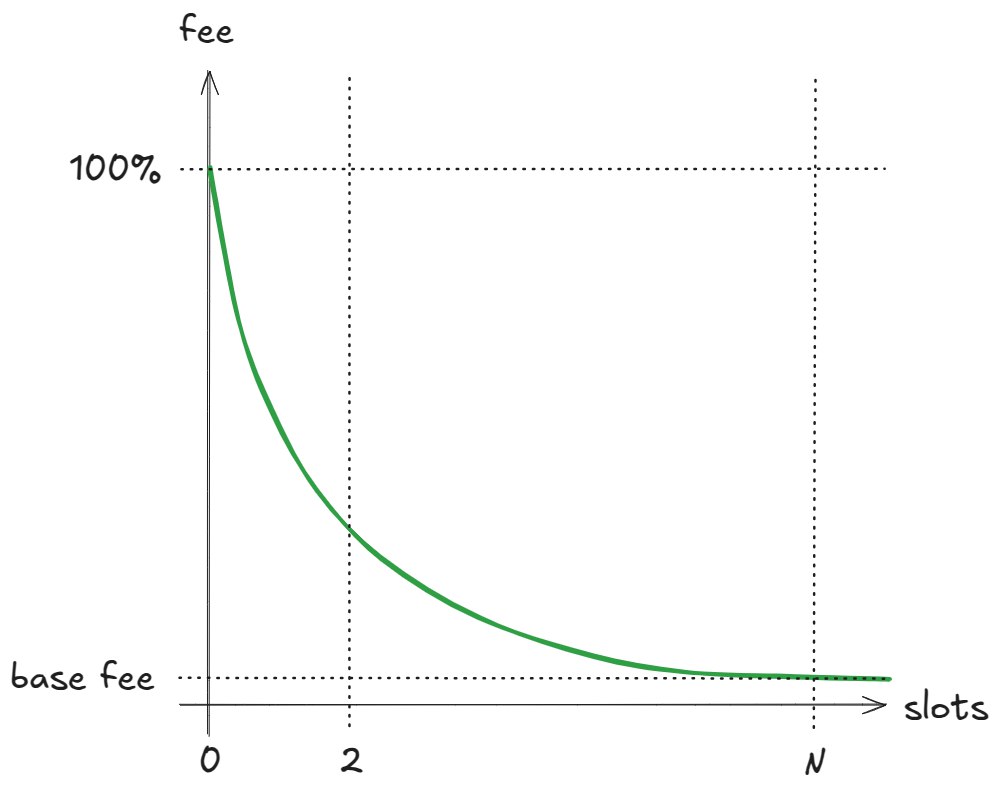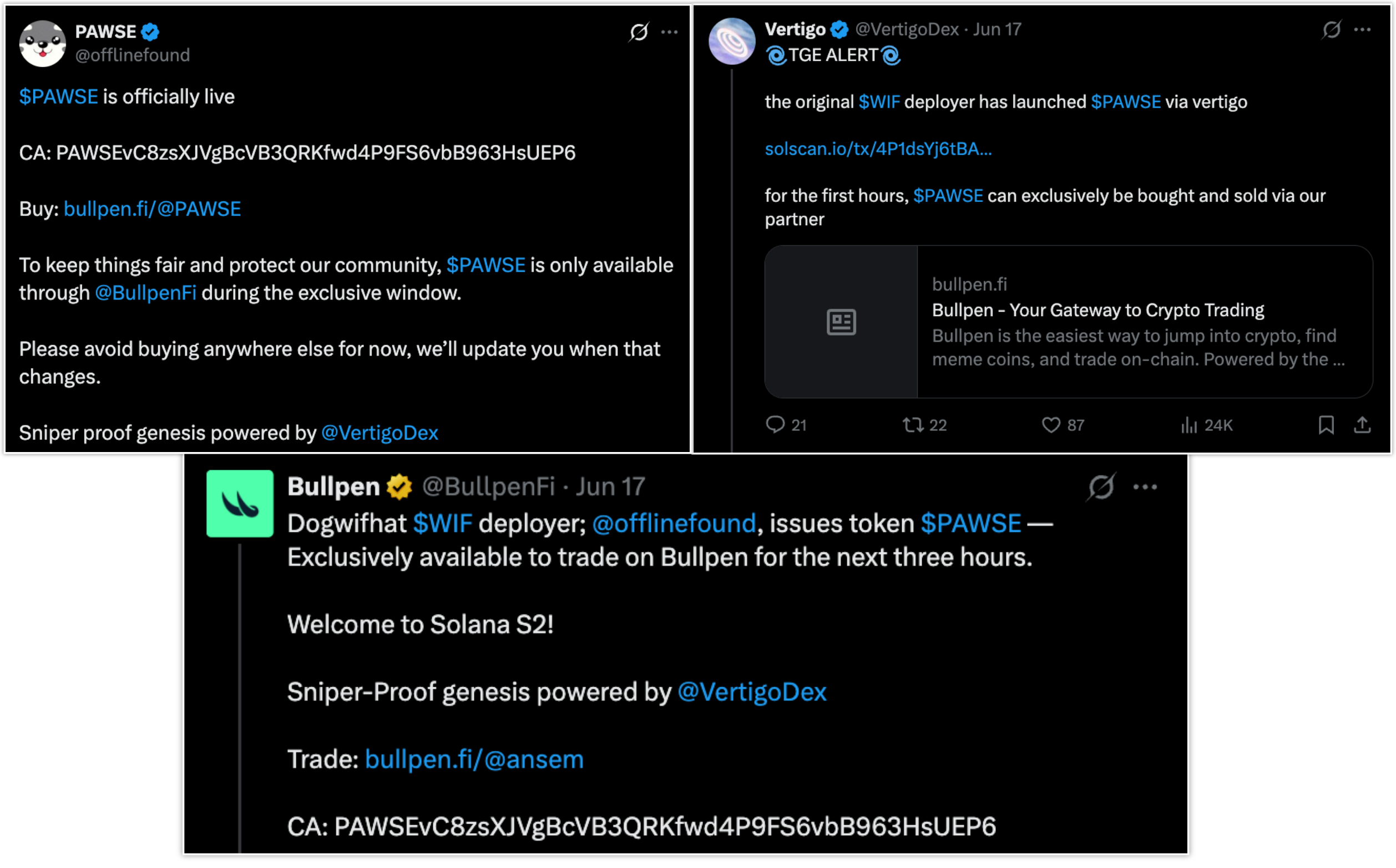
$PAWSE-Start durch umstrittene Handelssteuer beeinträchtigt
Die Rendite des $WIF-Deployers fiel flach, als die Händler merkten, dass sie ihre Token nicht verkaufen konnten.
- Veröffentlicht:
- Bearbeitet:
Einer der am heißesten erwarteten Memecoin-Starts der letzten Zeit, $PAWSE, hat eine etwas vergessliche erste 24-Stunden-Handelszeit hinter sich.
Trotz eines kometenhaften Anfangsanstiegs auf ein FDV von $100M schlug die Euphorie in Wut um, als uninformierte Händler erfuhren, dass sie einer 100%igen Handelssteuer unterliegen.
Verdienen Heckenschützen hohe Strafen für Front-Running ‘reguläre’ Händler, und sind Handelsplattformen verantwortlich für Nutzer, die die Dokumente nicht lesen?
Anti-Sniper-Start-Mechanismus geht nach hinten los
Am 17. Juni kehrte der sagenumwobene $WIF-Deployer zurück, um eine neue Münze, $PAWSE, zu starten. In einem Versuch, den Start vor Heckenschützen zu schützen, wurde $PAWSE auf dem Vertigo DEX bereitgestellt, mit der Bedingung, dass Händler über die Bullpen Handelsplattform kaufen.
Vertigo, ein aufstrebender DEX auf Solana, bietet Token-Anbietern die Möglichkeit, variable Handelssteuern auf Slot-Basis zu implementieren. Laut der Dokumentation von Vertigo gleicht dies das Spielfeld zwischen Scharfschützen und menschlichen Händlern aus.
Bei der Markteinführung stürzten sich Tausende von Händlern mit den unterschiedlichsten Handelsinstrumenten auf $PAWSE und trieben den Memecoin innerhalb weniger Minuten auf ein FDV von 100 Millionen Dollar. Jeder, der $PAWSE über ein anderes Tool als Bullpen kaufte, stellte jedoch schnell fest, dass er alles verloren hatte, und bezeichnete den Start als abscheulichen Betrug.
Solana’s Memecoin-Gräben sind geteilter Meinung darüber, ob der $PAWSE-Start ein extraktiver Betrug ist oder ein Paradigmenwechsel in der Art und Weise, wie man schießsichere Starts betreibt.
Natürlich scheint dem Diskurs ein gewisses Maß an Objektivität abhanden gekommen zu sein. Händler, die Geld verloren haben, sind schnell dabei, das Debakel als ausgeklügelten Betrug zu bezeichnen, während diejenigen, die profitiert haben, den Start als großen Erfolg betrachten.

Während das Vertigo-Modell behauptet, eine scharfschützensichere Umgebung zu schaffen, gibt es das Argument, dass es lediglich die Herangehensweise eines Scharfschützen an einen Abschuss verändert.
Die Senkung der Handelssteuersätze im Laufe der Zeit bedeutet nicht unbedingt, dass “menschliche Händler” zur gleichen Zeit wie Scharfschützen-Bots einsteigen können. Stattdessen wird lediglich der Zeitpunkt verschoben, zu dem die Scharfschützen ihren Handel durchführen. Außerdem zwingt das Modell die Scharfschützen dazu, selbst zu entscheiden, wie viel Steuern sie zu zahlen bereit sind, während sie die regulären Nutzer immer noch überholen.
Nach Ansicht des Gründers von Fluxbeam DEX und Rugcheck Scott Hague verschafft das Modell Scharfschützen immer noch einen erheblichen Vorteil:
“Scharfschützen haben im Allgemeinen immer noch einen enormen Vorteil, da sie genau schießen können, wenn die Gebühr niedrig genug ist, [das Vertigo-Modell] scheint sich nur auf uninformierte Benutzer auszuwirken, die versuchen, früh einzusteigen - da es’Da es sich um einen neuen DEX handelt, ist es sogar noch wirkungsvoller, da die Nutzer keine Ahnung haben, wie er funktioniert, während die Sniper über Ausfallsicherungen verfügen, um sicherzustellen, dass sie nicht von den Gebühren erschlagen werden” - Scott Hague, Fluxbeam, Rugcheck-Gründer
Eklatanter Betrug oder paradigmatischer Meta-Wechsel?
Während die Händler, die unwissentlich Gelder verloren haben, zu Recht frustriert sind, ist es erwähnenswert, dass Bullpen, Vertigo und das PAWSE 𝕏-Konto alle festlegten, dass PAWSE nur über die Bullpen-Plattform verfügbar war.

Das PAWSE-Team hat inzwischen mitgeteilt, dass alle Händler, die während der Markteinführung Geld verloren haben, über eine Steuerrückerstattung entschädigt werden. Allerdings wissen die Betroffenen noch nicht, wie viel sie zurückerhalten werden.
>Ansem, Solana KOL und Bullpen-Vertreter, hat das Modell nachdrücklich verteidigt und darauf hingewiesen, dass Bullpen weiterhin an der Entwicklung einer egalitäreren Startplattform arbeiten wird. Unterdessen haben konkurrierende Handelsplattformen andere Terminals ins Visier genommen, die den Handel nicht simulieren und die Nutzer vor der Steuer schützen.
Diese Position wurde von Hague weiter bekräftigt, der argumentiert, dass Handelsplattformen dafür verantwortlich sein sollten, unerwartete Swap-Ergebnisse zu verhindern.
“Handelsplattformen sind dafür verantwortlich, dass ihre Nutzer nicht mit 100 % Steuer belastet werden. Fluxbeam hat aus diesem Grund den neuen DEX noch nicht integriert.” - Scott Hague, Fluxbeam, Rugcheck Gründer
SolanaFloor beauftragte die Anwaltskanzlei Burwick Law mit der rechtlichen Klärung der Frage, ob Handelsplattformen haften, wenn Händler die Anweisungen nicht befolgen. Bis zum Redaktionsschluss hat die Kanzlei noch nicht geantwortet.
Lesen Sie mehr über SolanaFloor
pump.fun erneut unter Beschuss
Burwick Law: Über 500 Anleger klagen gegen pump.fun
Was sind Memecoins?


